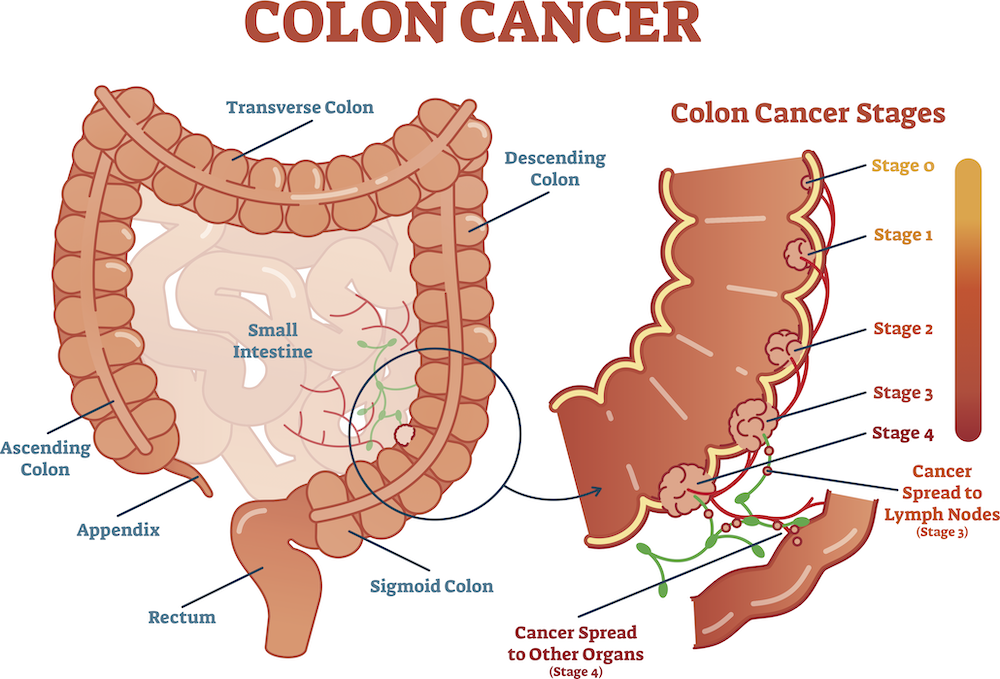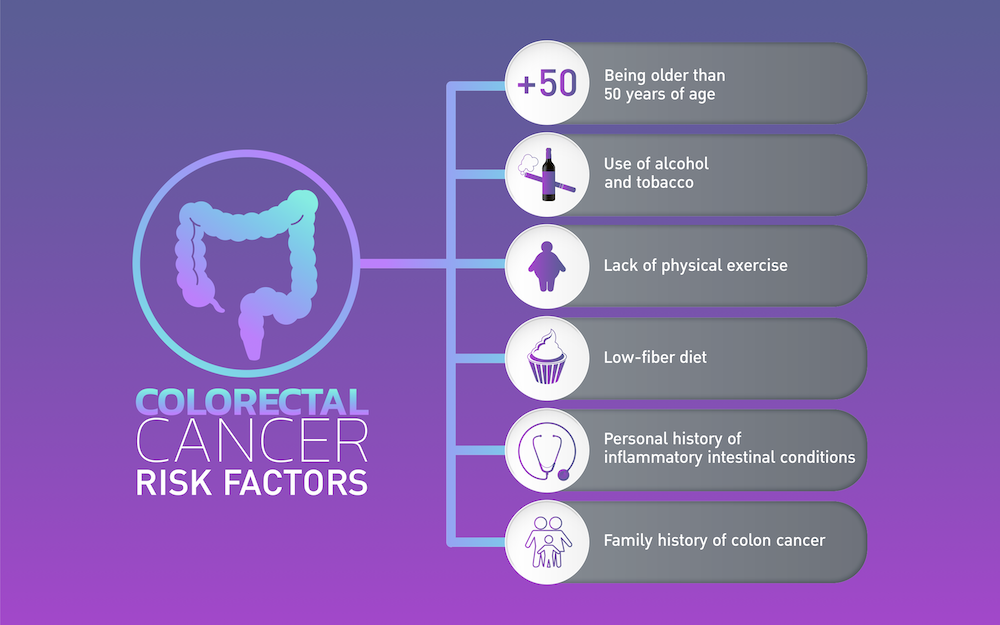TSC Rutherford
515 StoneCrest Pkwy | Suite 230 Smyrna, TN 37167
TEL 615.223.9935 FAX 615.891.5046
What is Colorectal Cancer?
Cancer in the colon/rectum
Cancer in general is a particular type of cell within your body that has begun to grow abnormally. Colorectal cancer is related to the cells within the colon that have begun to grow & create a mass in your intestine.
If your doctor finds cancerous polyps during a routine colonoscopy or through a scan, they will likely recommend you see a board certified specialist about the best treatment options for you.
Certain symptoms may indicate you have colorectal cancer; if you have symptoms, promptly see a doctor for a closer examination.
Colon Cancer Symptoms
Potential signs of colon cancer include:
- Change in bowel movements, like the consistency of your stool
- Blood in your stool
- Persistent abdominal pain, cramps, or gas
- Feeling like your bowels don’t completely empty
- Feeling weak or tired
- Unexplained weight loss

Colorectal Cancer Treatment
Undergoing surgery to treat colorectal surgery
You may need chemotherapy, radiation, other stents or procedures to help you continue to move your bowels while you’re undergoing the therapy for your colon cancer. Ultimately, we want to get you to having surgery to remove the cancer. And that’s where the general surgeon, like Dr. Joshua Taylor, comes in.
The goal of colorectal cancer surgery is to:
- cure you of cancer
- remove all of the cancer that’s there
- check the lymph nodes, which is the first place that the colon cancer often spreads
- evaluate anywhere else in the abdomen that there might be some cancer that needs to be removed
Types of Treatment for Colorectal Cancer
If you have colon or rectal cancer, there is a high chance you will undergo surgery to remove the tumor.
The type of operation you will receive depends on a number of factors, like
- Where in the colon you have a tumor (high, low, or middle part of the colon)
- The stage of cancer, and how far the cancer has spread
- The grade of cancer, determined by how the cells look under a microscope
With an MRI, doctors can determine which surgery and follow-up treatment you may need to remove the cancer and spot it from spreading. Small, early stage cancers may only need surgery, whereas larger tumors may require additional treatment. Options for colorectal cancer treatment include:
- Surgery
- Radiotherapy
- Chemotherapy
Colorectal Surgery Types
What types of surgery are done for colorectal cancer?
There are multiple types of surgery, though some are more common than others. Patients with colon or rectal cancer will likely have one of two procedures: trans anal endoscopic microsurgery (TEM) or total mesorectal excision (TME)
- Trans anal endoscopic microsurgery (TEM) – A surgeon uses a colonoscope, a flexible tube with a small light and camera, to see inside the bowel. The surgeon then removes the cancer and margins around the cancer.
- Total mesorectal excision (TME) – More common for rectal cancer, a surgeon removes part of the rectum, a margin, and fatty tissue around the rectum. The location of a TME can be high in the back, in the middle of the back, or low in the back, depending on the location of your cancer.
Stomas
In addition to cancer removal, your surgeon may bring the end of the bowel through an opening on your abdomen; this is called a stoma. The two types of stomas are an ileostomy and a colostomy. An ileostomy is an incision in the small bowel, and a colostomy is an incision in the large bowel.
Depending on the size and location of your colorectal cancer, the stoma may be either temporary or permanent. Your doctor will inform you which one you need. They will also refer you to a stoma nurse who will give you information on ostomy bags and how to use them.
Our Surgeons
The Surgical Clinic has a variety of surgeons who specialize in colorectal cancer surgery throughout Nashville and Middle Tennessee.
Who is at risk?
Who is at risk for colorectal cancer? → We know that there are some people who are more at risk for developing colon cancer. Whether that is because family members have had it or other potential gene mutations are evident. But, we’re also finding that people who are above the age of 50 are more at risk. This is something that screening can potentially pick up on and help prevent.
Risk factors of getting colorectal cancer:
- Anyone over the age of 50
- Alcohol and tobacco users
- Lack of physical exercise
- Low-fiber diet
- Personal history of inflammatory intestinal conditions
- Family history of colon cancer
Is Colorectal Cancer Surgery a Major Operation?
Yes, and since colorectal surgery is a major operation, the procedure comes with risks.
Colorectal Surgery Risk Factors
Infection → The colon/rectum naturally have bacteria in it, so there is a risk of infection. Often times before the surgery we will have you undergo a bowel cleanse. Both to empty out any stool in your colon as well as with antibiotics to decrease the number of bacteria in your colon.
Excessive bleeding → The colon and rectum have a very good blood supply, presenting a possible risk of bleeding during the procedure. As specialized general surgeon in colorectal surgery, when we perform the surgery, we tie off those blood vessels and make sure there is no ongoing evidence of bleeding.
A “leak” → When we remove part of the colon and put it back together, that is called an anastomosis, and that anastomosis needs to heal. So there is a risk that if it doesn’t heal, that’s something called a “leak”. This may cause a need for other procedures or being placed on antibiotics or even surgery again to repair or fix this problem.
How Successful is Colorectal Surgery?
Like any cancer, the earlier the detection, the more successful the surgery will likely be. Patients with early stage colorectal cancer have a five-year survival rate of 90%. However, for late stage cancers that have metastasized to distant organs and/or lymph nodes, the five-year survival rate is 14%. If the cancer has only spread to nearby organs and/or lymph nodes, the five-year survival rate is around 71%.
Will I need a bag after colorectal cancer surgery?
One of the questions that often comes up when we talk about colon and rectal cancer surgery is “will I need a bag?”
Often times, this depends on exactly where you cancer is and the type of surgery we need to perform.
The can either be something called a colostomy or an ileostomy. Your colorectal surgeon will explain to you in detail why you may need that.
Reasons you may need a colostomy or ileostomy:
If you’ve already received chemotherapy or radiation before your surgery, you may need to give more time for things to heal
There may be specific things, such as it creating a blockage or other specifics that would require for you to need an ostomy
Surgery for Colorectal Cancer
Minimally invasive colorectal cancer surgery
Surgery for colorectal cancer is diverse. Generally, this surgery is now performed minimally invasively with laparoscopic or robotic surgery. For you, that means there are multiple small incisions (versus traditional surgery with larger incisions). The biggest incision is usually between three and four inches where we remove the part of the colon that contained the cancer. Typically after surgery people are in the hospital 2-3 days to recover. Once you return home it usually takes several weeks before you’re ready to return to work and normal activities.
Colorectal Cancer doctors
What doctors are involved in treating colorectal cancer?
Colorectal cancer often involves multiple treatments. You may or may not have met with a gastroenterologist, a medical oncologist, and then the general surgeon. Oftentimes, all three of those doctors are involved in helping take care of your colorectal cancer.
Find a colorectal cancer surgeon
The board-certified general surgeons at TSC Rutherford in Smyrna, TN specialize in advanced minimally invasive surgery (like robotic surgery) for treating colorectal cancer. Give us a call today to learn more.
General/robotic surgeon in Smyrna, TN

Dr. Willie Melvin
General Surgeon
Smyrna

Dr. Joshua Taylor
General Surgeon
Smyrna

